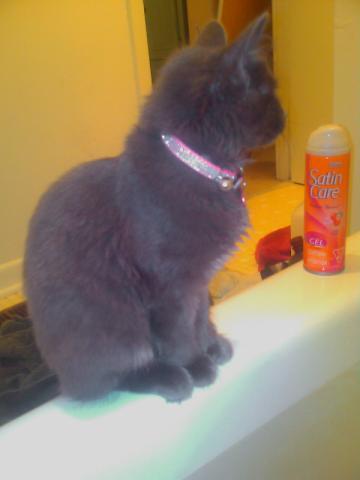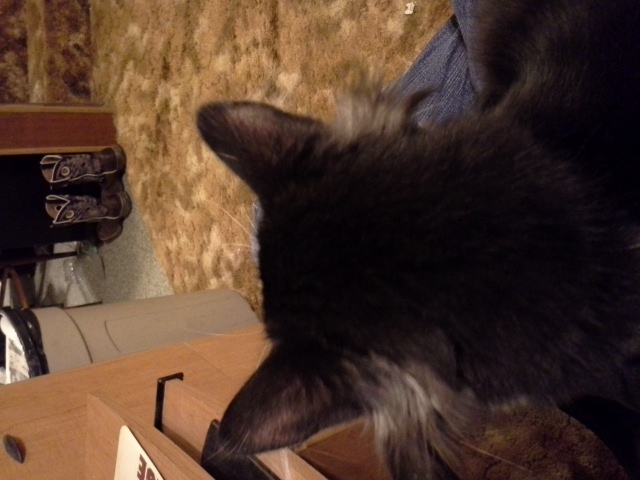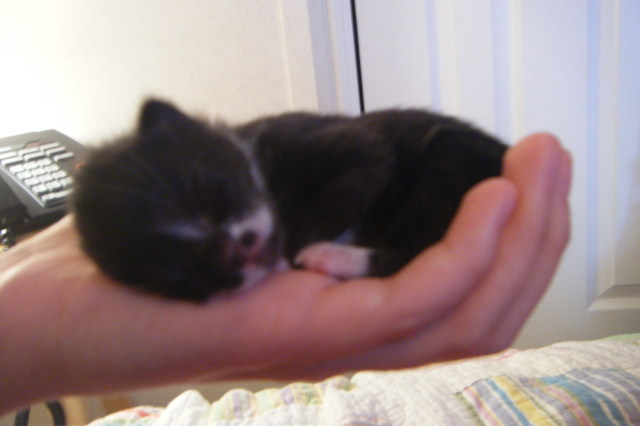Questioni recently got two young kittens and my older cat continually hisses at them. he is not aggressive towards them but will not allow them near the food area (all cats have seprate bowls in a common area) and will not allow them anywhere near our bed. how to i break him of this habit?
AnswerCat,
It's perfectly normal for your resident cat to react to the new kittens' presence in his territory (your home) by hissing, batting, growling and generally being a bit on the aggressive side. Cats are very territorial and they aren't fond of change. Most cats generally react with some level of aggression to a new cat being introduced to their territory if it hasn't been done gradually. The good news is that it sounds as though things are fairly mild in terms of the aggression that your older cat is exhibiting. The nice thing about new cat introductions is that you can do things over with great success. This will take a bit of time and patience, but it will be well worth it in the end. My recommendation would be to try a homeopathic remedy called Bach's Rescue Remedy which is a blend of flower essences that works well to calm cats and other animals down. I would suggest that you give your older cat about 8 drops in fresh water for each kitten every morning. You can generally find Rescue Remedy in natural health/health food stores. This remedy is very safe and has been used to treat anxiety and fear by some vets & some pet owners throughout the world.
If your older cat isn't sterilized then I would highly recommend having him neutered as soon as you can because sex hormones can certainly increase the potential for aggression and territorial behavior. Cats are quite territorial so they will often become anxious, fearful or aggressive with one another when meeting for the first time. I would also recommend that you place the new kittens into a room behind a closed door for a period of at least 2 to 3 weeks with all of the usual kitty necessities (food, water, comfy place to sleep, litter box and a few toys). It's important to note that isolation doesn't mean that you should ignore the kittens. It's very important that both babies get pets, cuddles, and interactive play time. The process of introducing a new feline family member includes isolation - this shouldn't mean total lack of attention, affection, or stimulation for the new arrival, this would result in serious behavioral and psychological issues developing. You can feed the kittens on opposite sides of the door from your resident cat as this will help to gradually introduce the new kittens to your resident cat. It's not a bad idea to use a hand towel and rub your new kittens down, then your resident cat and to the kittens again daily. The whole point of doing this is that it allows each cat to become accustomed to each other's unique scent. It is very important that the resident cat is given lots of attention and reassurance by the human family members while the new kittens are isolated as well as being sure to praise and reward polite behavior when introducing the kittens face to face a short time from now. The isolation period allows you to get to know your new arrivals and what their personalities are like. Once the first few days have gone by and your new littles one have become more confident in their new surroundings you will be able to get an accurate idea of essentials like how much the new kittens eat & litter box habits. Getting to know a new cat/kitten is always tons of fun and you should be quite aware of how energetic and playful your two little ones are by the time that they are comfortable with each other. The isolation period also allows you to place new feline family members in quarantine if you will. There are a number of very serious chronic health issues like feline leukemia and FIV which resemble HIV and AIDS in people. Unfortunately there is no way to know whether or not a new kitty has been exposed to or tested for these serious conditions if you don't have a medical history provided at the time of adoption from a previous caregiver, animal shelter or rescue group. These illnesses can be passed from cat to cat so sharing common food and water bowls or litter boxes and bedding shouldn't really be done prior to having new feline family members testing for these serious chronic health problems. It's quite common for cats and kittens coming from a shelter environment to have other health issues like conjunctivitis or upper respiratory infections, which are contagious to other cats and require supportive care as recommended by your family vet. Conjunctivitis can be passed on to people if they are giving a cat antibiotics to fight the infection or cleaning the discharge that usually comes with these types of infection from the cat's eyes which is why it's so important to wash your hands thoroughly in hot, soapy water after handling any cat or kitten with a confirmed or suspected eye infection. With a 2-3 week period of isolation, interactive play time geared towards both your new kittens and the resident kitty and positive reinforcement for calm behavior I am sure that the introductions will be much better next time. Questions regarding proper new cat introductions are quite common, if you would like further details or tips, please feel free to check out my past answers on the subject.

 urgent cat problem
Question
kitty aka chanel
my cat is about 7 mont
urgent cat problem
Question
kitty aka chanel
my cat is about 7 mont
 Is my kitten counted as a male calico?
QuestionQUESTION: I have a new litter of kittens and th
Is my kitten counted as a male calico?
QuestionQUESTION: I have a new litter of kittens and th
 2 sibling cats. one of the brothers just passed.
Question
Their last day togethe
how should i dea
2 sibling cats. one of the brothers just passed.
Question
Their last day togethe
how should i dea
 Can you give me an idea for possible cat breed?
Question
Tufts Maverick
My cat Maverick ha
Can you give me an idea for possible cat breed?
Question
Tufts Maverick
My cat Maverick ha
 I think my kittens got into our horses oats (with seed hulls)
Question
Our newborn baby :)
Hi there,
My kittens are
I think my kittens got into our horses oats (with seed hulls)
Question
Our newborn baby :)
Hi there,
My kittens are